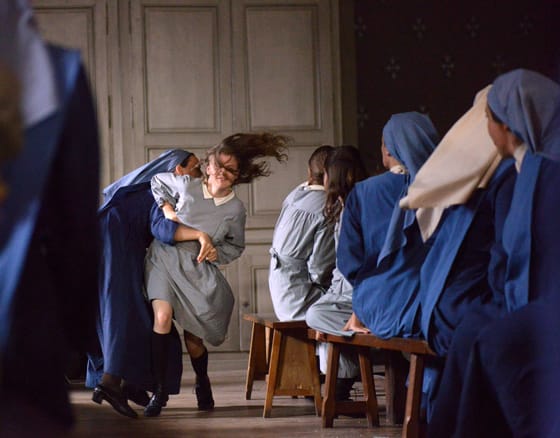In the "making of" supplement included with the DVD of the Marie Heurtin biopic, Marie's Story, director Jean-Pierre Améris discusses the benefits of shooting a film with a limited crew and modest budget. This is a small film with the simple but vital message about the importance of helping others. And shooting in the rural locale where Améris grew up allowed for an intimate on-set dynamic; even though it was a quick shoot, there was a camaraderie and casual nature that allowed the actors to settle into their roles and the moment without any added pressure.
Understandably, most of Marie's Story relies on non-verbal communication — Heurtin (Ariana Rivoire) was born blind and deaf. In late 19th Century France, such an affliction would normally result in lifelong institutionalization, but at the request of Sister Marguerite (Isabelle Carré), Marie was admitted into Larnay Institution, where the Daughters of Wisdom — a congregation of nuns founded to provide education and aid to the disadvantaged — taught deaf children sign language. The challenge was an unconventional one, as there was no established methodology for teaching those that were both blind and deaf to communicate with the outside world.
While a movie with this premise could easily adhere to the standard "inspirational teacher" tropes or rest on the obvious Christian subtext, Améris is more interested in capturing the gradual process of bonding and establishing trust.
Initially, Marie is borderline uncontrollable. She responds violently to touch and refuses any sort of external grooming. Marguerite, who is suffering from a debilitating illness herself, vacillates between patient teacher and frustrated woman, often devolving into wrestling matches with the girl in an effort to subdue her. The eventual trust that's built feels quite authentic and is derived from very carefully considered performances from both lead actresses who are forced, by sheer merit of the situation, into close confines, communicating entirely through touch.
In addition to capturing the complexities of human interaction and connection through simple visual indicators, Améris is also careful not to force any religious or political views onto the text. Though the cast is almost entirely comprised of nuns, there's not a single mention of God or any direct implication that Marguerite's eventual successes with Marie are divine in nature — in fact, nothing beyond the on-screen action is implied beyond the obvious implicit notion of Christian goodness, which allows a broader audience to appreciate the story for what it is without ideological alienation.
Marie's Story is about the importance of not giving up on people, and the far reach of a simple act of kindness. Beyond this bond, these teaching techniques — all of which were felt out with trial and error — opened the doors for other deaf and blind children, giving them the opportunity to communicate with the outside world.
The subtlety and careful consideration of this touching and unembellished drama is strangely juxtaposed with the amateurish short film, Motherly, which is also included with the DVD. In this short, a mother (who is blind) stalks her wheelchair-bound son at the park to find out who his secret girlfriend is. And when she finds out that her son has a bizarre Oedipus complex, it's played as cutesy and heart-warming rather than creepy and gross.
(Film Movement)Understandably, most of Marie's Story relies on non-verbal communication — Heurtin (Ariana Rivoire) was born blind and deaf. In late 19th Century France, such an affliction would normally result in lifelong institutionalization, but at the request of Sister Marguerite (Isabelle Carré), Marie was admitted into Larnay Institution, where the Daughters of Wisdom — a congregation of nuns founded to provide education and aid to the disadvantaged — taught deaf children sign language. The challenge was an unconventional one, as there was no established methodology for teaching those that were both blind and deaf to communicate with the outside world.
While a movie with this premise could easily adhere to the standard "inspirational teacher" tropes or rest on the obvious Christian subtext, Améris is more interested in capturing the gradual process of bonding and establishing trust.
Initially, Marie is borderline uncontrollable. She responds violently to touch and refuses any sort of external grooming. Marguerite, who is suffering from a debilitating illness herself, vacillates between patient teacher and frustrated woman, often devolving into wrestling matches with the girl in an effort to subdue her. The eventual trust that's built feels quite authentic and is derived from very carefully considered performances from both lead actresses who are forced, by sheer merit of the situation, into close confines, communicating entirely through touch.
In addition to capturing the complexities of human interaction and connection through simple visual indicators, Améris is also careful not to force any religious or political views onto the text. Though the cast is almost entirely comprised of nuns, there's not a single mention of God or any direct implication that Marguerite's eventual successes with Marie are divine in nature — in fact, nothing beyond the on-screen action is implied beyond the obvious implicit notion of Christian goodness, which allows a broader audience to appreciate the story for what it is without ideological alienation.
Marie's Story is about the importance of not giving up on people, and the far reach of a simple act of kindness. Beyond this bond, these teaching techniques — all of which were felt out with trial and error — opened the doors for other deaf and blind children, giving them the opportunity to communicate with the outside world.
The subtlety and careful consideration of this touching and unembellished drama is strangely juxtaposed with the amateurish short film, Motherly, which is also included with the DVD. In this short, a mother (who is blind) stalks her wheelchair-bound son at the park to find out who his secret girlfriend is. And when she finds out that her son has a bizarre Oedipus complex, it's played as cutesy and heart-warming rather than creepy and gross.
